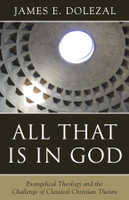
Dolezal, James
All That Is in God: Evangelical Theology and the Challenge of Classical Christian Theism (Dolezal)
Following his well-received Interpreting Scripture with the Great Tradition, Craig Carter presents the biblical and theological foundations of trinitarian classical theism. Carter, a leading Christian theologian known for his provocative defenses of classical approaches to doctrine, critiques the recent trend toward modifying or rejecting classical theism in favor of modern "relational" understandings of God. The book includes a short history of trinitarian theology from its patristic origins to the modern period, and a concluding appendix provides a brief summary of classical trinitarian theology.
Table of Contents:
Foreword by Carl R. Trueman
Prologue: How My Mind Has Changed
Part 1: Defining Trinitarian Classical Theism
1. Classical Orthodoxy and the Rise of Relational Theism
2. What Is Trinitarian Classical Theism?
Part 2: The Biblical Roots of Trinitarian Classical Theism
3. Interpreting Isaiah 40-48 Theologically
4. God as the Transcendent Creator (Isa. 40)
5. God as the Sovereign Lord of History (Isa. 41-48)
6. God as the One Who Alone Is to Be Worshiped (Isa. 41-48)
Part 3: Trinitarian Classical Theism in History
7. The Biblical Character of Pro-Nicene Theology
8. Creatio ex nihilo and the Rejection of Mythology
9. Do We Worship the God of the Bible?
Epilogue: Why the Church Does Not Change Its Mind
Appendix: Twenty-Five Theses on Trinitarian Classical Theism
Author
Craig A. Carter (PhD, University of St. Michael's College) is professor of theology at Tyndale University in Toronto and theologian in residence at Westney Heights Baptist Church in Ajax, Ontario. He is the author of four other books including...
Endorsements
"Carter shows that, far from putting God in a tidy box, the orthodox doctrine of God smashes our idolatrous tendencies and alerts us contemplatively to a better way found in Holy Scripture and prized in the Augustinian, Thomist, and Reformed traditions. Over against the mythologies of modern scientific study (even in its purportedly evangelical forms), Carter draws our gaze upward to the mysteries of the faith, outward to learn from the communion of saints, and forward to the never-ceasing call to contemplative exegesis of God's Word. Here evangelical and Reformed theological practice receives a needed recalibration." - Michael Allen, John Dyer Trimble Professor of Systematic Theology, Reformed Theological Seminary, Orlando, Florida
"Written clearly and engagingly, this book is a clarion call for evangelical Protestants to reject modern metaphysics and return to Nicene metaphysics. Carter sees the rise of what he calls 'relational theism' as a move, both conscious and unconscious, that surrenders God's transcendence in order to emphasize his activity in history. Through a detailed study of Isaiah 40-48, the author shows that transcendence, with its necessary corollaries of immutability and impassibility, is not a creation of the philosophers but a profoundly biblical idea, one that we surrender at our peril." - John N. Oswalt, visiting distinguished professor of Old Testament, Asbury Theological Seminary
"Craig Carter makes another important contribution to the theological interpretation of Scripture, upholding Nicene trinitarian classical theism against modern metaphysical assumptions. I commend his defense of responsible exegesis, showing how the inspired human authors, and therefore the divine author of Scripture, exercised polemical-corrective theology in their writing by engaging with ancient Near Eastern mythology and Greco-Roman metaphysics and revealing a transcendent, sovereign, unique, and personal God." - Aimee Byrd, author of Recovering from Biblical Manhood and Womanhood and Theological Fitness
"We have lots to learn from Carter's wonderful description and celebration of the biblical and theological merits of trinitarian classical theism. Carter writes with eloquence and humility, leading the reader toward an astonished inhabitation of the universal church's confession of the transcendent and sovereign Lord. Few books lead one to worship as overtly as Carter's, calling us to abandon shallow relational portraits of God in favor of delighting in the extraordinary grandeur of God." - Christopher Holmes, associate professor of systematic theology, head of the theology programme, School of Arts, University of Otago
"For decades evangelicals have been absorbing relational theism and have assumed that it is consistent with the biblical witness. Craig Carter exposes this faulty assumption, revealing social trinitarianism's radical inconsistency with Scripture's own presentation of the triune God. Thankfully, Carter also knows the antidote and summons us back to classical Christianity. Only by taking ressourcement seriously and sitting with hermeneutical humility at the feet of the Great Tradition can we escape the captivity of modern manipulations of the Trinity." - Matthew Barrett, associate professor of Christian theology, Midwestern Baptist Theological Seminary; author of Simply Trinity
"With an insider's knowledge of modern 'relational theism,' Carter is able to bring into sharp relief the choice that the church faces in its doctrine of God, a choice as vital as the one it faced in the fourth century. Will it return to trinitarian classical theism, or will it collapse God into the world and consign itself to the degenerative oblivion faced by pagan modernity and the liberal theological project that piggybacks upon it? Carter blends exegesis with sweeping cultural analysis to provide by both instruction and example an inspiring vision of the Christian doctrine of God as it should be done." - Garry J. Williams, director of the Pastors' Academy at London Seminary
"By revisiting the doctrines behind classical theism--Nicene orthodoxy--Carter takes readers on a journey to the past on a path that leads to the future. We have much to learn from the Nicene fathers: the exegesis, theology, and metaphysics that inform their doctrine of God is biblical and true. For those who love classical theism, this book serves as a welcome enchiridion; for those who are drawn to revisionary doctrines of God, this book serves as a worthy dialogue partner; and for anyone who wants to know the God of Scripture, this book is must reading." - J. V. Fesko, professor of systematic and historical theology, Reformed Theological Seminary, Jackson, Mississippi